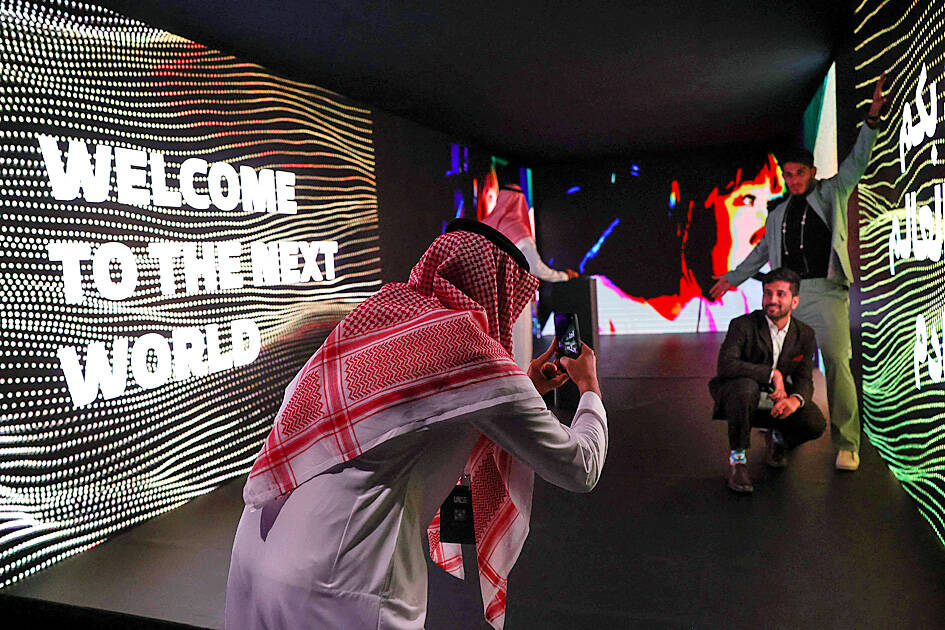Wearing headphones and anti-sweat finger sleeves, gamers from eight countries guided gun-toting avatars through a battle royale in the Saudi Arabian capital, as cheering onlookers watched the action on a big screen.
The PUBG Mobile tournament was part of Gamers8, a summer festival spotlighting Saudi Arabia’s emergence as a global e-sports dynamo — one that officials hope can compete with powerhouses such as China and South Korea.
Much like with Formula One and professional golf, the world’s biggest oil exporter has in the past few years leveraged its immense wealth to assert itself on the e-sports stage, hosting glitzy conferences and snapping up established tournament organizers.

Photo: AFP
These moves have attracted the kind of criticism Saudi Arabian officials have come to expect, with some e-sports leaders objecting to Riyadh’s human rights record.
Yet the lack of long-term financing for e-sports makes the industry especially eager to do business with Saudi Arabia, which helps explain why the backlash so far has been relatively muted, analysts say.
Saudi Arabian gamers are reveling in their country’s newfound status and the eye-watering prize pools it brings.
“In the past, there was no support,” said 22-year-old Faisal Ghafiri, who competed in the PUBG Mobile tournament, which featured US$3 million in prize money.
“Thank God, now is the best time for me to play e-sports and participate in tournaments,” he said, adding that what was once a hobby had transformed into a lucrative “job.”
Saudi Arabia’s interest in gaming and e-sports comes from the very top, with Crown Prince Mohammad bin Salman said to be an avid Call of Duty player.
The national e-sports federation was created in 2017, and the number of e-sports teams in the kingdom has since blossomed from two to more than 100.
Survey findings indicate 21 million people — nearly two-thirds of the national population — consider themselves gamers.
Last week, the prince released a national e-sports strategy that calls for the kingdom to create 39,000 e-sports-related jobs by 2030, while producing more than 30 games in domestic studios.
Gaming is also expected to be a major component of headline-grabbing development projects such as the Red Sea megacity NEOM, with its planned 170km-long twin skyscrapers known as The Line.
Yet NEOM is also where Saudi Arabia has encountered its biggest e-sports setback. Two years ago, Riot Games announced a partnership that would have made NEOM a sponsor of the European championship for the game League of Legends.
The outcry was immediate and intense, led by LGBTQ gamers who condemned Saudi Arabia’s prohibition of same-sex sexual acts, which can be a capital offense.
League of Legends is considered LGBTQ-friendly, having just last week named gay hip-hop star Lil Nas X as its honorary “president.”
Within 24 hours of its NEOM announcement, Riot Games backed out, and Danish tournament organizer BLAST terminated its deal with the megacity about two weeks later.
“Saudi Arabia’s reputation will always be a hindrance to the Western e-sports community, despite attempts to improve it,” said Jason Delestre of the University of Lille, who studies the geopolitics of e-sports.
Saudi Arabian officials are undeterred, and they have deep backing in the e-sports world.
“Gaming was always a bit more morally flexible, as they are mostly project-based and lack a sustainable business model,” said Tobias Scholz, an e-sports expert at the University of Siegen in Germany. “E-sports need the money compared to golf or others.”

Vincent Wei led fellow Singaporean farmers around an empty Malaysian plot, laying out plans for a greenhouse and rows of leafy vegetables. What he pitched was not just space for crops, but a lifeline for growers struggling to make ends meet in a city-state with high prices and little vacant land. The future agriculture hub is part of a joint special economic zone launched last year by the two neighbors, expected to cost US$123 million and produce 10,000 tonnes of fresh produce annually. It is attracting Singaporean farmers with promises of cheaper land, labor and energy just over the border.

US actor Matthew McConaughey has filed recordings of his image and voice with US patent authorities to protect them from unauthorized usage by artificial intelligence (AI) platforms, a representative said earlier this week. Several video clips and audio recordings were registered by the commercial arm of the Just Keep Livin’ Foundation, a non-profit created by the Oscar-winning actor and his wife, Camila, according to the US Patent and Trademark Office database. Many artists are increasingly concerned about the uncontrolled use of their image via generative AI since the rollout of ChatGPT and other AI-powered tools. Several US states have adopted

KEEPING UP: The acquisition of a cleanroom in Taiwan would enable Micron to increase production in a market where demand continues to outpace supply, a Micron official said Micron Technology Inc has signed a letter of intent to buy a fabrication site in Taiwan from Powerchip Semiconductor Manufacturing Corp (力積電) for US$1.8 billion to expand its production of memory chips. Micron would take control of the P5 site in Miaoli County’s Tongluo Township (銅鑼) and plans to ramp up DRAM production in phases after the transaction closes in the second quarter, the company said in a statement on Saturday. The acquisition includes an existing 12 inch fab cleanroom of 27,871m2 and would further position Micron to address growing global demand for memory solutions, the company said. Micron expects the transaction to

A proposed billionaires’ tax in California has ignited a political uproar in Silicon Valley, with tech titans threatening to leave the state while California Governor Gavin Newsom of the Democratic Party maneuvers to defeat a levy that he fears would lead to an exodus of wealth. A technology mecca, California has more billionaires than any other US state — a few hundred, by some estimates. About half its personal income tax revenue, a financial backbone in the nearly US$350 billion budget, comes from the top 1 percent of earners. A large healthcare union is attempting to place a proposal before